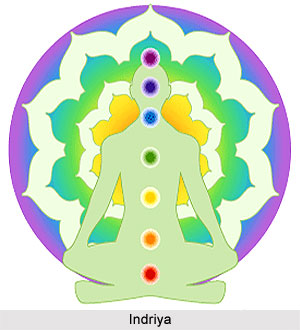 Indriya grasp data about objects which is transmitted to the intellect and interprets sensory information and forms ideas about what is presented. These ideas are observed by the conscious soul, which remains unchanged by its embodied experiences. According to the Nyaya-Vaiseshika a perception is a cognitive episode that follows in a form of contact between the physical sense faculties and the colours, shapes, sounds, smells and tastes of external objects to which each of them is related.
Indriya grasp data about objects which is transmitted to the intellect and interprets sensory information and forms ideas about what is presented. These ideas are observed by the conscious soul, which remains unchanged by its embodied experiences. According to the Nyaya-Vaiseshika a perception is a cognitive episode that follows in a form of contact between the physical sense faculties and the colours, shapes, sounds, smells and tastes of external objects to which each of them is related.
The senses grasp the object and transfer the information to the coordinating faculty which is physical. The central processor operates on the information received, which may be converted into a cognition that is raised to the level of clear awareness. Cognition occurs in the principle of identity. Each sense is correlated with its proper objects; the mind synthesizes the information received.
According to Indian philosophy Indriya is the instrument of a person`s direct perception of the outside world. They are two kinds - motoric and sensory. The motoric sense includes speaking, grasping, walking, ejaculating, and evacuating. The sensory faculties include hearing, touching, seeing, tasting, and smelling. Both these are correlated with the five elements of ether, wind, fire, water, and earth.
According to Buddhism each sense faculty is correlated with its proper objects, each sense object contact producing a different type of awareness. So for example when the eye is related to colours and shapes, a visual sensation occurs and it produces image awareness. Different sensory impressions cooperate to produce a complex sensation in a flow of experiences.
This article is a stub. You can enrich by adding more information to it. Send your Write Up to content@indianetzone.com












